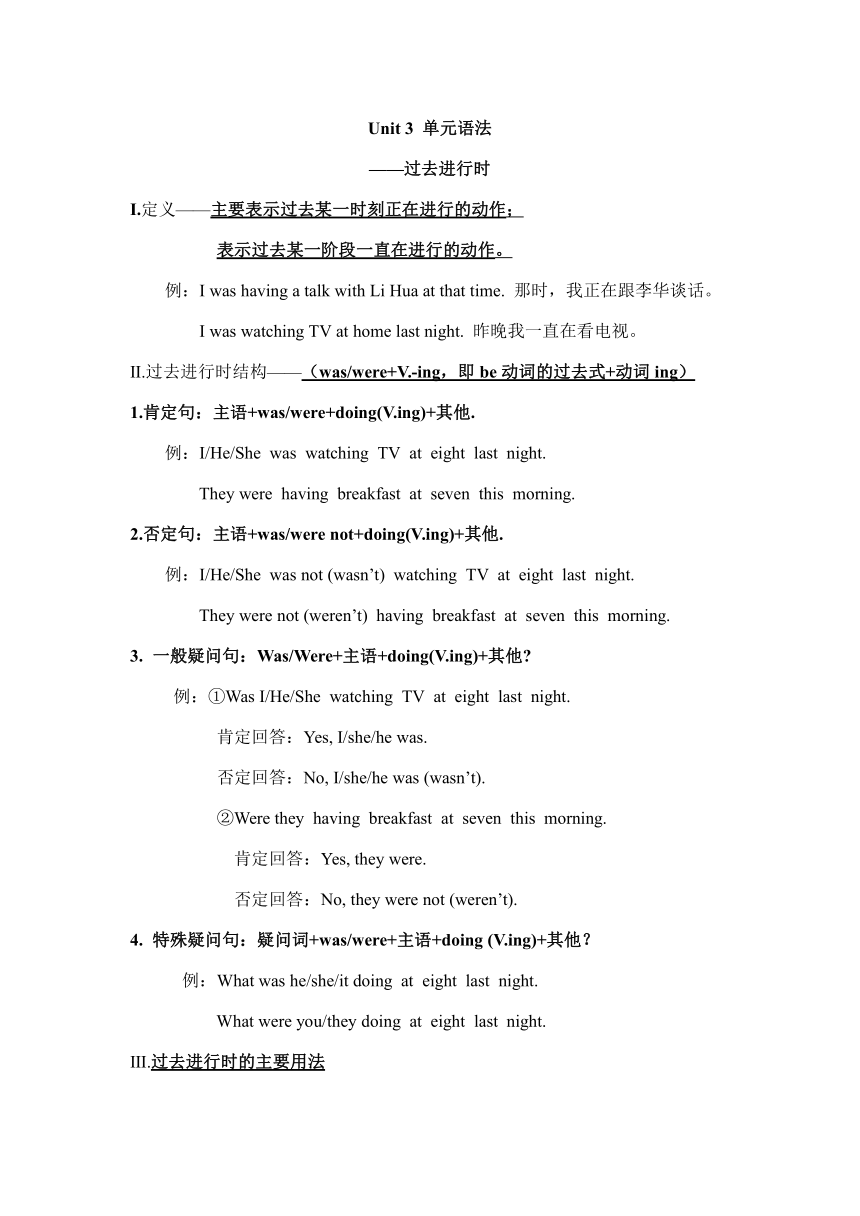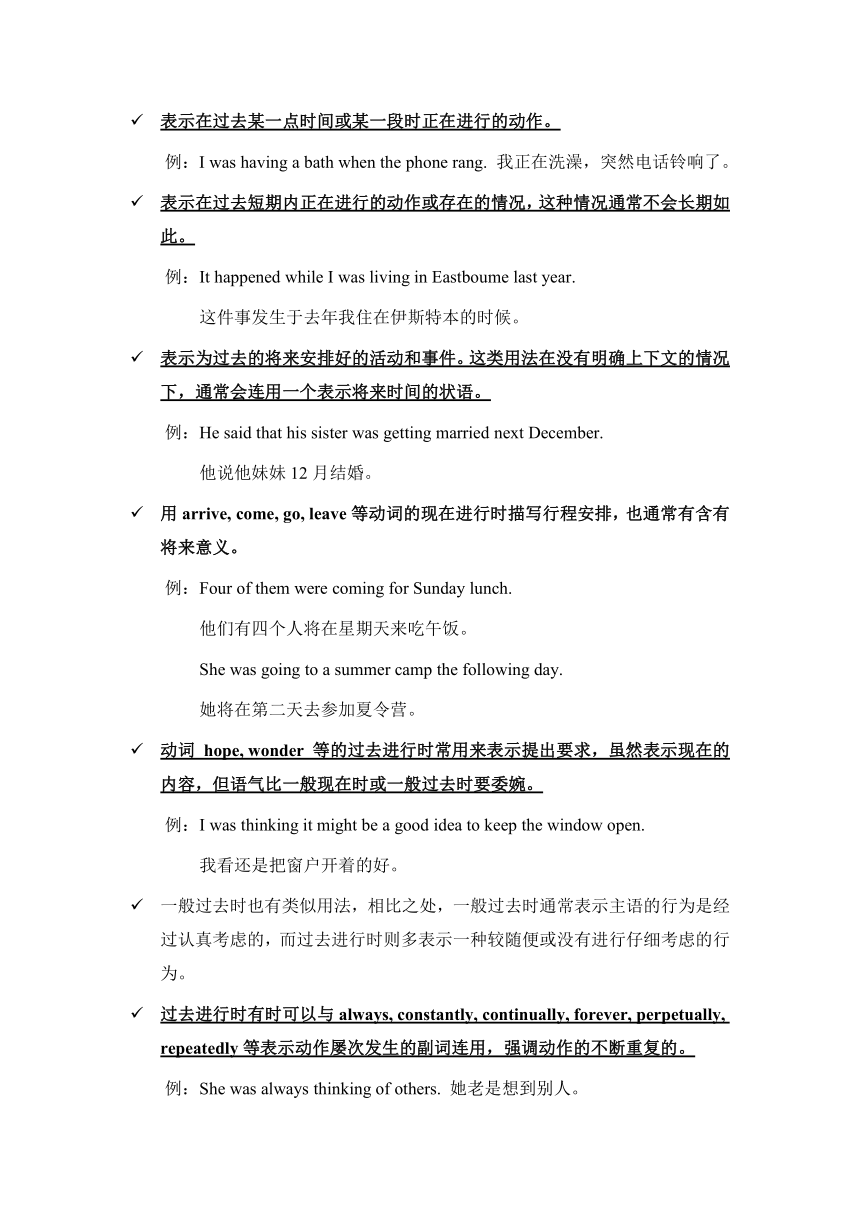Unit 3 What were you doing when the rainstorm came? 单元语法—过去进行时(无答案)
文档属性
| 名称 | Unit 3 What were you doing when the rainstorm came? 单元语法—过去进行时(无答案) |

|
|
| 格式 | docx | ||
| 文件大小 | 20.1KB | ||
| 资源类型 | 教案 | ||
| 版本资源 | 鲁教版 | ||
| 科目 | 英语 | ||
| 更新时间 | 2021-07-22 00:00:00 | ||
图片预览


文档简介
Unit
3
单元语法
——过去进行时
Ⅰ.定义——主要表示过去某一时刻正在进行的动作;
表示过去某一阶段一直在进行的动作。
例:I
was
having
a
talk
with
Li
Hua
at
that
time.
那时,我正在跟李华谈话。
I
was
watching
TV
at
home
last
night.
昨晚我一直在看电视。
Ⅱ.过去进行时结构——(was/were+V.-ing,即be动词的过去式+动词ing)
1.肯定句:主语+was/were+doing(V.ing)+其他.
例:I/He/She?was?watching?TV?at?eight?last?night.
They
were?having?breakfast?at?seven?this?morning.
2.否定句:主语+was/were
not+doing(V.ing)+其他.
例:I/He/She?was
not
(wasn’t)?watching?TV?at?eight?last?night.
They
were
not
(weren’t)?having?breakfast?at?seven?this?morning.
一般疑问句:Was/Were+主语+doing(V.ing)+其他?
例:①Was
I/He/She?watching?TV?at?eight?last?night.
肯定回答:Yes,
I/she/he
was.
否定回答:No,
I/she/he
was
(wasn’t).
②Were
they?having?breakfast?at?seven?this?morning.
肯定回答:Yes,
they
were.
否定回答:No,
they
were
not
(weren’t).
特殊疑问句:疑问词+was/were+主语+doing
(V.ing)+其他?
例:What
was
he/she/it
doing?at?eight?last?night.
What
were
you/they
doing?at?eight?last?night.
Ⅲ.过去进行时的主要用法
表示在过去某一点时间或某一段时正在进行的动作。
例:I
was
having
a
bath
when
the
phone
rang.
我正在洗澡,突然电话铃响了。
表示在过去短期内正在进行的动作或存在的情况,这种情况通常不会长期如此。
例:It
happened
while
I
was
living
in
Eastboume
last
year.
这件事发生于去年我住在伊斯特本的时候。
表示为过去的将来安排好的活动和事件。这类用法在没有明确上下文的情况下,通常会连用一个表示将来时间的状语。
例:He
said
that
his
sister
was
getting
married
next
December.
他说他妹妹12月结婚。
用arrive,
come,
go,
leave等动词的现在进行时描写行程安排,也通常有含有将来意义。
例:Four
of
them
were
coming
for
Sunday
lunch.
他们有四个人将在星期天来吃午饭。
She
was
going
to
a
summer
camp
the
following
day.
她将在第二天去参加夏令营。
动词
hope,
wonder
等的过去进行时常用来表示提出要求,虽然表示现在的内容,但语气比一般现在时或一般过去时要委婉。
例:I
was
thinking
it
might
be
a
good
idea
to
keep
the
window
open.
我看还是把窗户开着的好。
一般过去时也有类似用法,相比之处,一般过去时通常表示主语的行为是经过认真考虑的,而过去进行时则多表示一种较随便或没有进行仔细考虑的行为。
过去进行时有时可以与always,
constantly,
continually,
forever,
perpetually,
repeatedly等表示动作屡次发生的副词连用,强调动作的不断重复的。
例:She
was
always
thinking
of
others.
她老是想到别人。
He
was
constantly
changing
his
mind.
他老是改变主意。
现在进行时也有类似用法,但过去进行时是表示过去不断重复的动作,而现在进行时是表示现在不断重复的动作。
Ⅳ.过去进行时的时间标志词
at+具体时刻+过去时间(如at
five
clock
yesterday)
例:He
was
watching
TV
at
9:00
pm
yesterday.
at
this
time
+
过去时间(如at
this
time
yesterday)
例:He
was
watching
TV
at
this
time
yesterday.
过去的一个时间段(如from
nine
to
ten
last
night)
例:He
was
watching
TV
from
nine
to
ten
yesterday.
at
that
time/moment(e.g.
at
that
time/moment
last
night)
例:He
was
watching
TV
at
that
time/moment
yesterday.
when
&
while引导的过去时间状语从句
例:He
was
watching
TV
when/while
his
mother
went
downstairs
yesterday.
昨天当他妈妈下楼的时候,他正在看电视。
Ⅴ.过去进行时和一般过去时的区别
1.一般过去时:已经完成的动作;
例:I
read
a
book
yesterday.
我昨天读完了一本书。(已读完)
过去进行时:未完成的动作:
例:I
was
reading
a
book
yesterday.
我昨天正在读一本书。(未读完)
2.一般过去时:通常只说明过去某时发生某事;
过去进行时:侧重在动作的持续时间,而不仅仅时说明事实:
例:It
rained/was
raining
all
night.
该例句中,用一般过去时和过去进行时都可以,意义无差别,只是用过去进行时更加突出下雨时间持续之久。
3.当一般过去时与过去进行时同事出现在句中时,通常是表示较短的动作用一般过去时,表示较长时间用过去进行时。
例:I
broke
a
glass
while
I
was
cooking
the
dinner.
4.注意一般过去时与过去进行时表示的动作的时间顺序:
例:①When
we
arrived,
she
was
making
some
coffee.
②When
we
arrived,
she
made
some
coffee.
句①表示,我们到达时,她正在煮咖啡;句②表示,我们到达以后,她才煮咖啡。
语法专练
ⅰ.单项选择
--I
didn’t
see
you
at
the
meeting
yesterday.
Why?
--I
for
an
important
telephone
call
at
that
moment.
A.wait
B.waited
C.am
waiting
D.was
waiting
She
to
an
English
program
while
her
parents
TV.
A.was
listening;is
watching
B.listened;were
watching
C.was
listening;watched
D.was
listening;were
watching
They
her
to
the
party,
so
she
was
very
happy.
A.invite
B.invited
C.will
invite
D.are
inviting
David
shopping
last
weekend.
A.went
B.was
going
C.is
going
D.goes
My
brother
came
back
while
I
homework.
A.am
doing
B.did
C.was
doing
D.were
doing
--I
called
you
at
4:00
yesterday
afternoon,
but
no
one
answered.
--Sorry,
I
with
my
friends
at
that
time.
A.swim
B.swam
C.will
swim
D.was
swimming
It
was
Friday
evening.
Mr.and
Mrs.Green
ready
to
fly
to
England.
A.are
getting
B.get
C.were
getting
D.got
My
uncle
books
in
the
room
at
this
time
yesterday.
A.was
reading
B.read
C.reads
D.is
reading
ⅱ.用所给词的适当形式填空。
--What
you
at
seven
last
night?
(do)
--I
(see)
a
film.
When
the
bell
rang,
Jenny
(wait)
in
her
seat.
I
first
met
Lisa
two
years
ago.
She
(work)
in
a
shop
at
that
time.
She
(make)
her
dress
the
whole
afternoon
that
day.
Many
children
(skate)
on
the
ice
now
Sally
walked
to
Jack
while
he
(play)
a
computer
game.
My
mother
(buy)
me
a
new
English-Chinese
dictionary
yesterday.
3
单元语法
——过去进行时
Ⅰ.定义——主要表示过去某一时刻正在进行的动作;
表示过去某一阶段一直在进行的动作。
例:I
was
having
a
talk
with
Li
Hua
at
that
time.
那时,我正在跟李华谈话。
I
was
watching
TV
at
home
last
night.
昨晚我一直在看电视。
Ⅱ.过去进行时结构——(was/were+V.-ing,即be动词的过去式+动词ing)
1.肯定句:主语+was/were+doing(V.ing)+其他.
例:I/He/She?was?watching?TV?at?eight?last?night.
They
were?having?breakfast?at?seven?this?morning.
2.否定句:主语+was/were
not+doing(V.ing)+其他.
例:I/He/She?was
not
(wasn’t)?watching?TV?at?eight?last?night.
They
were
not
(weren’t)?having?breakfast?at?seven?this?morning.
一般疑问句:Was/Were+主语+doing(V.ing)+其他?
例:①Was
I/He/She?watching?TV?at?eight?last?night.
肯定回答:Yes,
I/she/he
was.
否定回答:No,
I/she/he
was
(wasn’t).
②Were
they?having?breakfast?at?seven?this?morning.
肯定回答:Yes,
they
were.
否定回答:No,
they
were
not
(weren’t).
特殊疑问句:疑问词+was/were+主语+doing
(V.ing)+其他?
例:What
was
he/she/it
doing?at?eight?last?night.
What
were
you/they
doing?at?eight?last?night.
Ⅲ.过去进行时的主要用法
表示在过去某一点时间或某一段时正在进行的动作。
例:I
was
having
a
bath
when
the
phone
rang.
我正在洗澡,突然电话铃响了。
表示在过去短期内正在进行的动作或存在的情况,这种情况通常不会长期如此。
例:It
happened
while
I
was
living
in
Eastboume
last
year.
这件事发生于去年我住在伊斯特本的时候。
表示为过去的将来安排好的活动和事件。这类用法在没有明确上下文的情况下,通常会连用一个表示将来时间的状语。
例:He
said
that
his
sister
was
getting
married
next
December.
他说他妹妹12月结婚。
用arrive,
come,
go,
leave等动词的现在进行时描写行程安排,也通常有含有将来意义。
例:Four
of
them
were
coming
for
Sunday
lunch.
他们有四个人将在星期天来吃午饭。
She
was
going
to
a
summer
camp
the
following
day.
她将在第二天去参加夏令营。
动词
hope,
wonder
等的过去进行时常用来表示提出要求,虽然表示现在的内容,但语气比一般现在时或一般过去时要委婉。
例:I
was
thinking
it
might
be
a
good
idea
to
keep
the
window
open.
我看还是把窗户开着的好。
一般过去时也有类似用法,相比之处,一般过去时通常表示主语的行为是经过认真考虑的,而过去进行时则多表示一种较随便或没有进行仔细考虑的行为。
过去进行时有时可以与always,
constantly,
continually,
forever,
perpetually,
repeatedly等表示动作屡次发生的副词连用,强调动作的不断重复的。
例:She
was
always
thinking
of
others.
她老是想到别人。
He
was
constantly
changing
his
mind.
他老是改变主意。
现在进行时也有类似用法,但过去进行时是表示过去不断重复的动作,而现在进行时是表示现在不断重复的动作。
Ⅳ.过去进行时的时间标志词
at+具体时刻+过去时间(如at
five
clock
yesterday)
例:He
was
watching
TV
at
9:00
pm
yesterday.
at
this
time
+
过去时间(如at
this
time
yesterday)
例:He
was
watching
TV
at
this
time
yesterday.
过去的一个时间段(如from
nine
to
ten
last
night)
例:He
was
watching
TV
from
nine
to
ten
yesterday.
at
that
time/moment(e.g.
at
that
time/moment
last
night)
例:He
was
watching
TV
at
that
time/moment
yesterday.
when
&
while引导的过去时间状语从句
例:He
was
watching
TV
when/while
his
mother
went
downstairs
yesterday.
昨天当他妈妈下楼的时候,他正在看电视。
Ⅴ.过去进行时和一般过去时的区别
1.一般过去时:已经完成的动作;
例:I
read
a
book
yesterday.
我昨天读完了一本书。(已读完)
过去进行时:未完成的动作:
例:I
was
reading
a
book
yesterday.
我昨天正在读一本书。(未读完)
2.一般过去时:通常只说明过去某时发生某事;
过去进行时:侧重在动作的持续时间,而不仅仅时说明事实:
例:It
rained/was
raining
all
night.
该例句中,用一般过去时和过去进行时都可以,意义无差别,只是用过去进行时更加突出下雨时间持续之久。
3.当一般过去时与过去进行时同事出现在句中时,通常是表示较短的动作用一般过去时,表示较长时间用过去进行时。
例:I
broke
a
glass
while
I
was
cooking
the
dinner.
4.注意一般过去时与过去进行时表示的动作的时间顺序:
例:①When
we
arrived,
she
was
making
some
coffee.
②When
we
arrived,
she
made
some
coffee.
句①表示,我们到达时,她正在煮咖啡;句②表示,我们到达以后,她才煮咖啡。
语法专练
ⅰ.单项选择
--I
didn’t
see
you
at
the
meeting
yesterday.
Why?
--I
for
an
important
telephone
call
at
that
moment.
A.wait
B.waited
C.am
waiting
D.was
waiting
She
to
an
English
program
while
her
parents
TV.
A.was
listening;is
watching
B.listened;were
watching
C.was
listening;watched
D.was
listening;were
watching
They
her
to
the
party,
so
she
was
very
happy.
A.invite
B.invited
C.will
invite
D.are
inviting
David
shopping
last
weekend.
A.went
B.was
going
C.is
going
D.goes
My
brother
came
back
while
I
homework.
A.am
doing
B.did
C.was
doing
D.were
doing
--I
called
you
at
4:00
yesterday
afternoon,
but
no
one
answered.
--Sorry,
I
with
my
friends
at
that
time.
A.swim
B.swam
C.will
swim
D.was
swimming
It
was
Friday
evening.
Mr.and
Mrs.Green
ready
to
fly
to
England.
A.are
getting
B.get
C.were
getting
D.got
My
uncle
books
in
the
room
at
this
time
yesterday.
A.was
reading
B.read
C.reads
D.is
reading
ⅱ.用所给词的适当形式填空。
--What
you
at
seven
last
night?
(do)
--I
(see)
a
film.
When
the
bell
rang,
Jenny
(wait)
in
her
seat.
I
first
met
Lisa
two
years
ago.
She
(work)
in
a
shop
at
that
time.
She
(make)
her
dress
the
whole
afternoon
that
day.
Many
children
(skate)
on
the
ice
now
Sally
walked
to
Jack
while
he
(play)
a
computer
game.
My
mother
(buy)
me
a
new
English-Chinese
dictionary
yesterday.
同课章节目录
- Unit 1 Could you please clean your room?
- Section A
- Section B
- Unit 2 Why don't you talk to your parents?
- Section A
- Section B
- Unit 3 What were you doing when the rainstorm came
- Section A
- Section B
- Unit 4 An old man tried to move the mountains.
- Section A
- Section B
- Unit 5 What's the highest mountain in the world?
- Section A
- Section B
- Unit 6 Have you read Treasure Island yet?
- Section A
- Section B
- Unit 7 Have you ever been to a museum?
- Section A
- Section B
- Unit 8 I've had this bike for three years.
- Section A
- Section B
